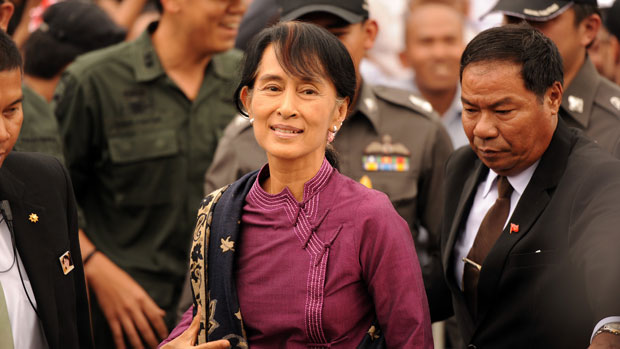Is Burma regime inciting Rakhine conflict to discredit Aung San Suu Kyi?
Conflict between Rakhine Buddhists and Rohingya Muslims could force opposition leader to make an unpopular intervention

A free daily email with the biggest news stories of the day – and the best features from TheWeek.com
You are now subscribed
Your newsletter sign-up was successful
CHIANG MAI – As sectarian violence continues unabated in Burma's westernmost state of Arakan, suspicion is growing that the clashes between Buddhists and minority Muslims are part of a government plot to discredit the hugely popular opposition leader Aung San Suu Kyi and weaken the threat she poses to its military-backed power base.
"The violence is clearly well orchestrated and not as spontaneous as we are being led to believe," said Burma expert and author Bertil Lintner, whose latest book, Great Game East, is about to be published. The book deals with "the power play in the eastern border regions of the Indian subcontinent".
Dozens have so far died and hundreds of homes have been burnt down in a week-long wave of deadly clashes between Muslim Rohingya and Buddhist Rakhine communities along the western, Andaman Sea coast, of Burma.
The Week
Escape your echo chamber. Get the facts behind the news, plus analysis from multiple perspectives.

Sign up for The Week's Free Newsletters
From our morning news briefing to a weekly Good News Newsletter, get the best of The Week delivered directly to your inbox.
From our morning news briefing to a weekly Good News Newsletter, get the best of The Week delivered directly to your inbox.
Religious and racial tensions have always run high in this backward state - known in Burmese as Rakhine - where the Rohingya minority are denied many basic rights, even Burmese citizenship. Hundreds of thousands of Rohingya, most of them men, have fled, either overland to neighbouring Bangladesh - where they are classed as illegal immigrants - or even in open boats to Thailand and Malaysia.
Burma observers are asking why the long-dormant tensions have broken surface at this point in time, when a newly-elected government in the capital, Naypyidaw, is winning international approval for the small advances it is making in the areas of political liberalisation and human rights.
"The answer is plain to see," Lintner told The Week. "The government is very worried about the support commanded by Suu Kyi. It wants to force her into a position where she has to make a pro-Rohingya public statement that could damage her popularity among Burma's Buddhists, where anti-Muslim sentiment runs high. On the other hand, if she remains silent she will disappoint those who support her firm stand on human rights."
A long-time observer of the Burma scene, who requested anonymity, agreed."Suu Kyi is damned if she does and damned if she doesn't," he said. "She is in a very difficult situation, which could seriously damage her reputation and erode much of her popularity."
A free daily email with the biggest news stories of the day – and the best features from TheWeek.com
Maung Zarni, a visiting fellow at the London School of Economics, agreed that the government could benefit from the crisis because it diverted attention from its continuing military efforts to subdue other restive ethnic groups.
Fighting is particularly fierce in Kachin State, where Lintner recently toured the Sino-Burmese border area and confirmed that up to 300,000 Kachin refugees had sought shelter in China from bitter fighting between the Burma Army and the Kachin Independence Army.
Lintner pointed out that the Arakan crisis comes at a critical time for Suu Kyi, just as she is preparing to leave on a European visit, starting on 15 June.
"She will be expected to make public statements on the violence in Rakhine State," he said. "This is such a difficult challenge that she might even call off her trip to Europe."
Suu Kyi was further embarrassed this week by anti-Rohingya statements by two human rights activists who were previously among her staunchest supporters.
"The Rohingya are not a Burmese ethnic group," said Ko Ko Gyi, a leader of the now-disbanded 88 Students Generation activist group, who was recently given an amnesty after serving five years' imprisonment for defying the former military regime.
"The root cause of the violence… comes from across the border and foreign countries," he said.
"This is astonishing stuff coming from a supposed human rights activist," said one Western observer. "Such statements go a long way to support the belief that the government is trying to manipulate opposition circles wherever it can in order to sabotage Aung San Suu Kyi."